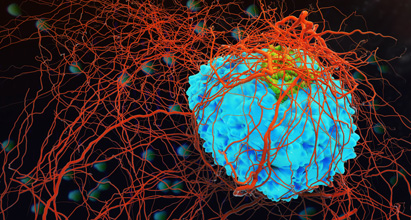teaser
Chris Cairns,
Consultant Editor
A quick glance at this edition shows that we are concentrating very much on the treatment of cancer. It got me to thinking about our role as hospital pharmacists in the diagnosis and treatment of cancer and the challenges that this common pathology gives us. After heart disease, cancer is the commonest cause of death in many Western countries. In most Western societies, the incidence of many cancers is decreasing and the success of treatment improving. However, cancer is not a single disease but a whole range of conditions with a common central pathology, namely malignant proliferating cells. Even more pronounced is the wide variety in treatment outcomes. Some cancers have high response rates, such as childhood leukaemia and teratoma, while others have proven to be resistant to treatment, particularly solid tumours such as lung and bowel cancers. Where has our contribution been, and what more can we do?
The first role that comes to mind is that of cytotoxic drug preparation. This is a widespread function, and in many healthcare systems it was, and continues to be, a solid foundation for many other pharmacy roles. We have applied our traditional preparative skills to provide patients with ready doses in a safe manner. Much of the drive for cytotoxic reconstitution services was the safety of the staff preparing them. The realisation came rapidly that this process dramatically reduced preparation errors and also added another safety check against prescribing errors. A beneficial side-effect is that there are economic benefits, both in savings in nursing and/or medical staff time and in drug costs.
In many cases, the safety check against prescribing errors is the first step in the provision of a specialist clinical pharmacy service. In my experience, the role of the specialist oncology pharmacist quickly moved out of the reconstitution unit to the patient’s bedside. The role of the oncology pharmacist now encompasses a whole range of activities – prescription monitoring, preparation of protocols and monitoring of those protocols, management of the adverse effects of chemotherapy, patient counselling and education and training of medical, nursing and other staff, to name a few. In many cancer units, the pharmacist is seen very much as a vital member of the multidisciplinary team.
These are brief descriptions of only two of the core roles of oncology pharmacists. We must not forget areas such as palliative care, clinical trials and the management of the entry of new cancer drugs. Cancer is a disease where there are still many challenges. Many cancers are still not well treated, and they are a major source of mortality and morbidity. Cancer treatment itself is still a major source of morbidity, discomfort and inconvenience for the patient. Treatment will continue to develop, and this area is one where many of the new treatments are leading us into new and uncharted waters. Are we ready for the revolution that will be driven by monoclonal antibodies and gene therapy?
Chris Cairns, Consultant Editor

